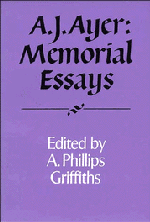Book contents
- Frontmatter
- Contents
- Preface
- A Defence of Empiricism
- Ayer: the Man, the Philosopher, the Teacher
- Ayer's Place in the History of Philosophy
- AYER'S ATTACK ON METAPHYSICS
- Ayer and World Views
- Language, Newspeak and Logic
- On the relation between Common Sense, Science and Metaphysics
- Logical Positivism and Intentionality
- Probability and the Evidence of our Senses
- Seeing Qualia and Positing the World
- Three Varieties of Knowledge
- The Importance of ‘If’
- Ayer's Ethical Theory: Emotivism or Subjectivism?
- Subjectivism and Toleration
- An Interview with A. J. Ayer
- Notes on Contributors
- References
- Index
Ayer: the Man, the Philosopher, the Teacher
Published online by Cambridge University Press: 01 July 2010
- Frontmatter
- Contents
- Preface
- A Defence of Empiricism
- Ayer: the Man, the Philosopher, the Teacher
- Ayer's Place in the History of Philosophy
- AYER'S ATTACK ON METAPHYSICS
- Ayer and World Views
- Language, Newspeak and Logic
- On the relation between Common Sense, Science and Metaphysics
- Logical Positivism and Intentionality
- Probability and the Evidence of our Senses
- Seeing Qualia and Positing the World
- Three Varieties of Knowledge
- The Importance of ‘If’
- Ayer's Ethical Theory: Emotivism or Subjectivism?
- Subjectivism and Toleration
- An Interview with A. J. Ayer
- Notes on Contributors
- References
- Index
Summary
I have told elsewhere the story of my first meeting with Freddie Ayer, but I shall re-tell it. It made a great impact on me, though, I believe, none on him. Certainly at no point in our friendship did he ever bring it up.
It was mid or late 1946. I was an undergraduate at Balliol, having returned from three years in the army, and I was reading for Part II of the History Schools. Most of my friends, most of my intellectual friends, were reading philosophy, and there was a necessity, which I already sensed, for my returning to Oxford once again to follow in their footsteps. This happened later in the autumn of 1947. Post-war Oxford was a very different place from the Firbankian hothouse of wartime Oxford, at least as I knew it. We were all said to be ‘more mature’, but within the confines of austerity, we were determined to enjoy ourselves. Oxford was not, in the famous words that Max Beerbohm put into the mouth of Mrs Humphrey Ward, ‘wholly serious’.
I was living in Holywell Manor, the Balliol annexe, at the time. If I had been out late, or sometimes for no particular reason, I would climb into Holywell Manor. ‘Climb into it’, I say, but the truth of the matter is that this involved no more than walking across the pretty churchyard of St Cross, raising one leg sharply, and stepping over the wall. The walk took me past the gravestone of Walter Pater, one of my heroes. On this particular evening, having climbed in, I walked straight back to the Porter's Lodge to see if there were any messages for me.
- Type
- Chapter
- Information
- A. J. Ayer: Memorial Essays , pp. 17 - 30Publisher: Cambridge University PressPrint publication year: 1992
- 1
- Cited by



